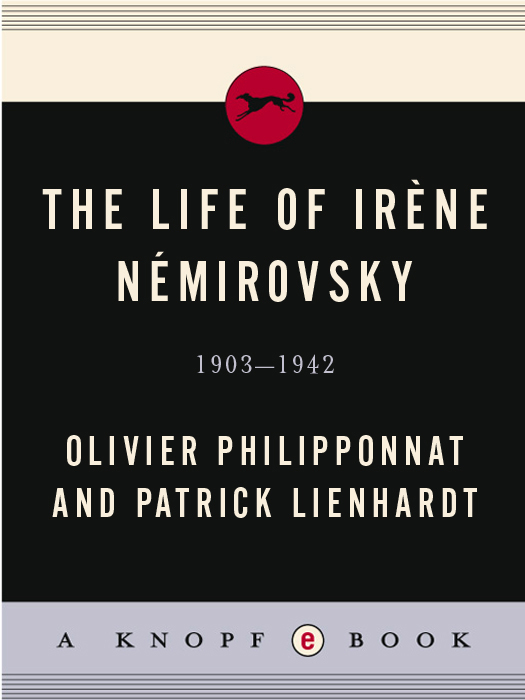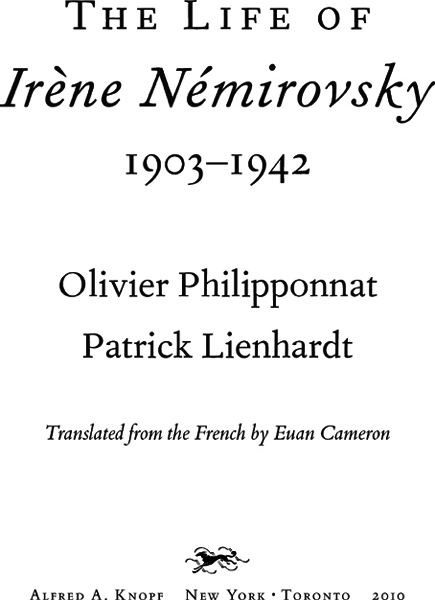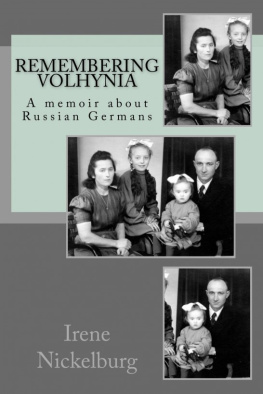Olivier Philipponnat - The life of Irène Némirovsky, 1903—1942
Here you can read online Olivier Philipponnat - The life of Irène Némirovsky, 1903—1942 full text of the book (entire story) in english for free. Download pdf and epub, get meaning, cover and reviews about this ebook. year: 2010, publisher: Alfred A. Knopf, genre: Non-fiction. Description of the work, (preface) as well as reviews are available. Best literature library LitArk.com created for fans of good reading and offers a wide selection of genres:
Romance novel
Science fiction
Adventure
Detective
Science
History
Home and family
Prose
Art
Politics
Computer
Non-fiction
Religion
Business
Children
Humor
Choose a favorite category and find really read worthwhile books. Enjoy immersion in the world of imagination, feel the emotions of the characters or learn something new for yourself, make an fascinating discovery.

- Book:The life of Irène Némirovsky, 1903—1942
- Author:
- Publisher:Alfred A. Knopf
- Genre:
- Year:2010
- Rating:5 / 5
- Favourites:Add to favourites
- Your mark:
- 100
- 1
- 2
- 3
- 4
- 5
The life of Irène Némirovsky, 1903—1942: summary, description and annotation
We offer to read an annotation, description, summary or preface (depends on what the author of the book "The life of Irène Némirovsky, 1903—1942" wrote himself). If you haven't found the necessary information about the book — write in the comments, we will try to find it.
The life of Irène Némirovsky, 1903—1942 — read online for free the complete book (whole text) full work
Below is the text of the book, divided by pages. System saving the place of the last page read, allows you to conveniently read the book "The life of Irène Némirovsky, 1903—1942" online for free, without having to search again every time where you left off. Put a bookmark, and you can go to the page where you finished reading at any time.
Font size:
Interval:
Bookmark:


To my dear parents.
To Malika and Kiran.
O.P .
To Christine, Tho and Pierre
P.L .
Like other such lives, like all lives, this is a tragedy; high hopes, noble efforts; under thickening difficulties and impediments, ever-new nobleness of valiant effort;and the result, death
Thomas Carlyle, The Life of John Sterling, 1851
I should like this to be used as an epitaph when I die, but its a very vain notion. And, anyway, inscriptions on tombs are expensive.
Irne Nmirovsky, 1934
P ART I
P ART II
P ART III
I RNE N MIROVSKY often alluded to the fact that prior to writing, she began by filling her notebooks with biographical pointers about the least of her characters; it was what she called the previous life of the novel. Then, she reread her notes, criticising and commenting as she went, and at the same time providing some fascinating reflections on her craft as a writer.
In 2004, nothing appeared to survive of these drafts, brimming as they were with personal memories and autobiographical notes, apart from the manuscript of Suite Franaise, one of the least characteristic of her method of working. She had, however, kept most of them. During the course of 2005, we were fortunate to see draft versions surface of David Golder, of Le Pion sur lchiquier (The Pawn on the Chessboard), The Wine of Solitude (Le Vin de Solitude), Les Echelles du Levant, or Le Matre des mes (The Ports of the Levant, or The Master of Souls), The Dogs and the Wolves (Les Chiens et les Loups), as well as the first sketches for Captivit, the third part of Suite Franaise. Among them were an unpublished novel, Fire in the Blood (Chaleur du sang), at that point in fragments, a number of short stories, some writings from her youth and some separate pages.
Yet, she herself was not the least among the real-life people on whom she based her characters. Thus a number of the pages in the working notebook for The Wine of Solitude contain memories of conversations, of asides overheard twenty years previously, reconstructed through an occasionally painful feat of memory, which we reproduce faithfully in the first part of this book. In this way, the previous life of Irne Nmirovsky in imperial and revolutionary Russia, that of her parents and grandparents, her exile in Finland and later in Sweden, which until now were only known about because of a few administrative documents and some interviews given to the press in the 1930s, have sprung from oblivion with a wealth of astonishing detail, sometimes corroborated by new archival information and unpublished family testimony.
In this biography, we indicate the source of all quotations taken from the published work of Irne Nmirovsky. In certain casesmostly autobiographicalwhere the source is not giventhey have come from these manuscripts, diaries and working notebooks, all of which are kept at the Institut Mmoires de ldition contemporaine (IMEC), at Ardenne Abbey in Normandy.
W HEN REFERRING to Irne Nmirovskys published work, I have used the English title where the translation is already available or about to be translated; elsewhere, I have used the French title. All the extracts from Irne Nmirovskys novels and short stories included in this biography have been translated by Sandra Smith, the gifted translator of Suite Franaise and other fictional works by Irne Nmirovsky published in English. I should like to record my gratitude to Sandra for her advice and collaboration. I should also like to thank Olivier Philipponnat for diligent elucidation and help on certain aspects of his and his co-author Patrick Lienhardts text, and Dominique Enright for her meticulous and sensitive editing of my manuscript. Others who have kindly come to my aid include Anthea Bell, Robert Chandler, Geraldine DAmico, Michel Don, the late Miles Huddleston, Raphalle Liebaert, Koukla MacLehose and Nelly Munthe.
E.C.
I Think We Are Leaving Today
(16th/17th July 1942)
That children, women, men, mothers and fathers should be treated like lowly cattle, that members of the same family should be separated from one another and taken off to an unknown destination; it was to be the fate of our age to witness this sad spectacle.
Monseigneur Jules Salige, Archbishop of Toulouse, Pastoral letter Et clamor Jerusalem ascendit, 23 August 1942
I T IS A WAGON fitted with a sliding door, used for transporting cattle. Straw has been thrown in and a bucket of water placed inside. The small, high air vents have been covered in barbed wire, so that it is impossible to escape once the sliding door has been closed. A prison on wheels, attached to another, which pulls a third, and so on. On 17th July 1942, this convoy is the sixth to leave France. Its nine hundred and twenty-eight passengers have not asked to leave, they have no tickets, they have only a suitcase and a few belongings. They do not know their destination and their loved ones do not know where they are going.
Some of these travellers have been misleadingly convened during the round-up of the Jews in Paris, on 14th May 1941, for verification of status. Since then, they have been stagnating in a very basic camp, from which it would have been so easy to escape had they not been terrified of exposing their families to reprisals. Over the past few weeks, women and children have also been arrested. It was a task made all the simpler since all or nearly all of them declared themselves to the authorities: what did they risk, in France, by conforming to the law? Others, like her, were taken from their homes only a few days previously. They were not surprised at their arrest: ever since October 1940, the police have been authorised to intern Jews in special camps, at the discretion of the prfets, the local chief commissioners.
For they are all Jews, all foreigners: tantamount to an offence in occupied France. They have walked through Pithiviers in single file, suitcase in hand, past the windows of the local inhabitants. They passed the sugar refinery, stepped over the railway lines, and walked through the wooden gate guarded by a policeman. Once registered, they were led into some large military sheds where bedsteads covered in straw could accommodate about one hundred adults. Needless to say, the Loiret region could have done without this gift, Lcho de Pithiviers regretted on 24th May 1941. Nevertheless, carefully supervised, the foreign Jews will not be too dangerous. And it is far preferable, all things considered, to know that they are behind barbed wire fences instead of running our town halls and our important services The purging of France has thus begun in earnest. Let us admit that it was very necessary and that it has not come a moment too soon.
The French police put in charge of guarding the camp are not bad men. Just disciplinarians. Some of them helped with the visits and the receiving of parcels, and they posed for souvenir photographs with the prisoners. But since the summer of 1941, the rules have been tightened. Refusing to do forced labour in the neighbouring farms, several hundred prisoners eventually absconded. As a retaliatory measure, no further leaves were permitted and visits were cancelled. It became pointless to try to evade the guards, who were stationed in watchtowers and behind the railings. Once they were recaptured, those who had escaped were locked up for a few days in a small prison made of corrugated iron, open to the full sunlight. The German authorities decided to convert this collection of sheds and those at Beaune-la-Rolande, built in 1940 to house potential prisoners of war, into transit camps for the concentration camp of Auschwitz-Birkenau, in Poland. Over there, all these Jews can be herded in their tens of thousands, far from prying eyes, and when the time camesometimes immediatelymurdered in the gas chambers, which have been in operation since earlier in 1942.
Font size:
Interval:
Bookmark:
Similar books «The life of Irène Némirovsky, 1903—1942»
Look at similar books to The life of Irène Némirovsky, 1903—1942. We have selected literature similar in name and meaning in the hope of providing readers with more options to find new, interesting, not yet read works.
Discussion, reviews of the book The life of Irène Némirovsky, 1903—1942 and just readers' own opinions. Leave your comments, write what you think about the work, its meaning or the main characters. Specify what exactly you liked and what you didn't like, and why you think so.








